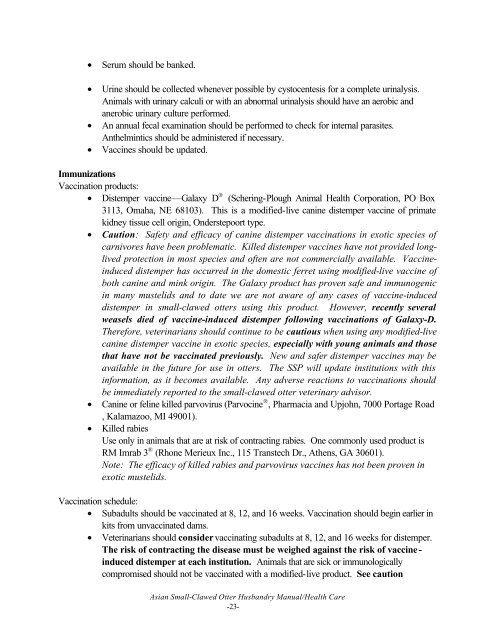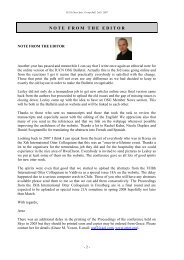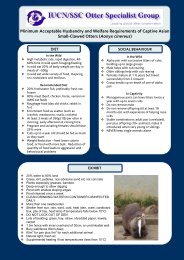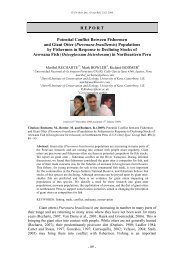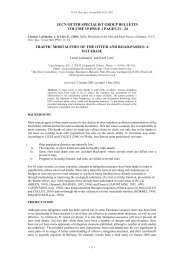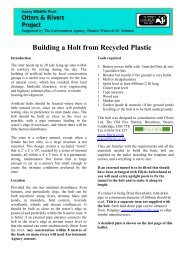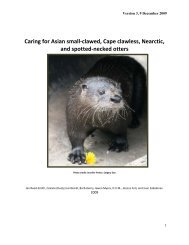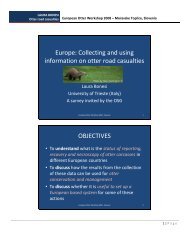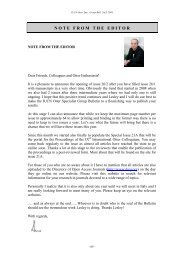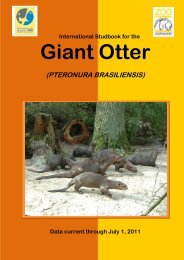Asian Small-Clawed Otter Husbandry Manual (1998)
Asian Small-Clawed Otter Husbandry Manual (1998)
Asian Small-Clawed Otter Husbandry Manual (1998)
Create successful ePaper yourself
Turn your PDF publications into a flip-book with our unique Google optimized e-Paper software.
• Serum should be banked.• Urine should be collected whenever possible by cystocentesis for a complete urinalysis.Animals with urinary calculi or with an abnormal urinalysis should have an aerobic andanerobic urinary culture performed.• An annual fecal examination should be performed to check for internal parasites.Anthelmintics should be administered if necessary.• Vaccines should be updated.ImmunizationsVaccination products:• Distemper vaccine—Galaxy D ® (Schering-Plough Animal Health Corporation, PO Box3113, Omaha, NE 68103). This is a modified-live canine distemper vaccine of primatekidney tissue cell origin, Onderstepoort type.• Caution: Safety and efficacy of canine distemper vaccinations in exotic species ofcarnivores have been problematic. Killed distemper vaccines have not provided longlivedprotection in most species and often are not commercially available. Vaccineinduceddistemper has occurred in the domestic ferret using modified-live vaccine ofboth canine and mink origin. The Galaxy product has proven safe and immunogenicin many mustelids and to date we are not aware of any cases of vaccine-induceddistemper in small-clawed otters using this product. However, recently severalweasels died of vaccine-induced distemper following vaccinations of Galaxy-D.Therefore, veterinarians should continue to be cautious when using any modified-livecanine distemper vaccine in exotic species, especially with young animals and thosethat have not be vaccinated previously. New and safer distemper vaccines may beavailable in the future for use in otters. The SSP will update institutions with thisinformation, as it becomes available. Any adverse reactions to vaccinations shouldbe immediately reported to the small-clawed otter veterinary advisor.• Canine or feline killed parvovirus (Parvocine ® , Pharmacia and Upjohn, 7000 Portage Road, Kalamazoo, MI 49001).• Killed rabiesUse only in animals that are at risk of contracting rabies. One commonly used product isRM Imrab 3 ® (Rhone Merieux Inc., 115 Transtech Dr., Athens, GA 30601).Note: The efficacy of killed rabies and parvovirus vaccines has not been proven inexotic mustelids.Vaccination schedule:• Subadults should be vaccinated at 8, 12, and 16 weeks. Vaccination should begin earlier inkits from unvaccinated dams.• Veterinarians should consider vaccinating subadults at 8, 12, and 16 weeks for distemper.The risk of contracting the disease must be weighed against the risk of vaccineinduceddistemper at each institution. Animals that are sick or immunologicallycompromised should not be vaccinated with a modified-live product. See caution<strong>Asian</strong> <strong>Small</strong>-<strong>Clawed</strong> <strong>Otter</strong> <strong>Husbandry</strong> <strong>Manual</strong>/Health Care-23-


